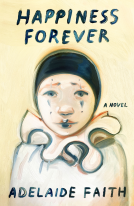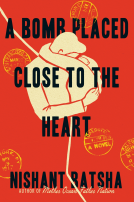
If You Kept a Record of Sins
by Andrea Bajani
This title was previously available on NetGalley and is now archived.
Send NetGalley books directly to your Kindle or Kindle app
1
To read on a Kindle or Kindle app, please add kindle@netgalley.com as an approved email address to receive files in your Amazon account. Click here for step-by-step instructions.
2
Also find your Kindle email address within your Amazon account, and enter it here.
Pub Date Mar 23 2021 | Archive Date Jan 15 2021
Talking about this book? Use #IfYouKeptaRecordofSins #NetGalley. More hashtag tips!
Description
A prismatic novel that records the indelible marks a mother leaves on her son after she abandons their home in Italy for a business she's building in Romania. Lorenzo, just a young boy when his mother leaves, recalls the incisive fragments of their life - when they would playfully wrestle each other, watch the sunrise, or test out his mother's newest scientific creation. Now a young man, Lorenzo travels to Romania for his mother's funeral and reflects on the strangeness of today's Europe, which masks itself as a beacon of Western civilization while iniquity and exploitation run rampant. With elliptical, piercing prose, Bajani tells a story of abandonment and initiation, of sentimental education and shattered illusions, of unconditional love.
Advance Praise
• "Andrea Bajani's haunting portrait of a mother-son relationship accumulates with the quiet urgency of a snowstorm. The impact is shattering, pure. With themes of distance and dislocation at its heart, this celebrated novel by one of Italy's most talented young writers now resonates in English thanks to Elizabeth Harris' limpid translation." -- Jhumpa Lahiri
• "A beautiful, original, and deeply moving work of art. It would be a gift at any time in history and is all the more so now, as the world moves through one of its darker periods." -- Michael Cunningham
• "If You Kept a Record of Sins is written with grace and calm control. It deals with loss, especially the loss of a mother, with a chiseled sense of truth. Each image and each moment are captured with exquisite emotional accuracy. The connection between the past and the present is dramatized with skill. The protagonist is, like the author himself, someone on whom nothing is lost." -- Colm Tóibín
• "One of Italy's greatest writers . . . An elegy, a requiem, a reckoning, a broken portrait of an absent mother, If You Kept a Record of Sins is a jewel of a book. You will hold it to your heart when you are done." -- Andrew Sean Greer, winner of the 2018 Pulitzer Prize for Less
• Every search is a search for oneself. In Andrea Bajani's novel, the search for the lost mother reveals not only the true protagonist of the story, but a scathing portrait of Western culture and its greed and selfish lust for power. Bajani has written a wise, lyrical, beautifully stylized book that clings for long in the reader's memory. I couldn't put it down. -- Alberto Manguel
• Borgesian brevity, a lesson in intensity. A book of rare beauty. -- Enrique Vila-Matas
• "Writing such as this makes me happy again, and it gives me comfort, because it is itself a form of resistance." -- Antonio Tabucchi
• "What do you say to the dead, especially if the one who died is the one who bore you? This is the question Andrea Bajani wrestles with in this beautifully rendered letter from a son to his estranged mother. The story is woven together around a handful of central mysteries: who was this person, where did she go, what was left unsaid? The way is marked by a handful of enigmatic images: an egg you can climb inside, a palace you can see from the moon, a river you cross to take a photograph on the far bank, a photograph you will leave for your son, which will tell him all he needs to know." -- Nick Flynn
• "A short, stoic novel, of a realism reaching toward hallucination and a squalor leading to despair, a love letter and a requiem for an absent mother--Andrea Bajani's If You Kept a Record of Sins is an unforgettable book. Together with the author, we wait, enthralled, for the break of dawn, when all the lights will go out." -- Mircea Cărtărescu
• "Part of a brilliant new generation of Italian writers that includes names like Paolo Giordano, Elena Ferrante, and Mirko Sabatino." -- Fernando Hernández Urías
• "Bajani is confirmed as a keen and sensitive traveler, one of the best Italian writers of the moment." -- Francis M. Cataluccio
Available Editions
| EDITION | Other Format |
| ISBN | 9781939810960 |
| PRICE | $18.00 (USD) |
| PAGES | 200 |
Featured Reviews
 John L, Reviewer
John L, Reviewer
This was an incredibly readable novella, but one that left me a little conflicted. We start as our hero arrives at Bucharest airport, and before we even know his gender or the nature of the person he's addressing in his second person monologue of a narration, we see him picked up by his mother's chauffeur, and carted off to do all the necessary introductions before said mother is buried the following day. The mother was a businesswoman, who clearly settled in Romania with her (night-time and business) partner, and feelings of abandonment are still strong. And so we flit from current (well, this came out in the original Italian in 2007, so moderately current) Bucharest, to the lad's childhood, and see just what he has to tell her as a private farewell address.
And this is where the confliction lies. The piece seems so heartfelt, such a bitter elegy, but at times the bitterness seems really unfounded. Our narrator at times appears to have been what might be summarised as an Oedipal plonker, literally wrestling with his mummy when she's cleaving herself from the family she's built, and clearly hating the fact a new man came along that to this day he can hardly ever mention him by name – it's 99% "your partner" instead. How very dare she fail at the marriage (not the only time, we find out). How very very dare she be an Italian woman who is also an entrepreneur and not a stay-at-home feeder of mummy's boy.
What the piece also annoyed me with was the racism in here. This, I admit, is a bit more of a character's voice than the author's, but it does smack of anti-Eastern Europe bigotry when not only Bucharest but Poland and several other countries get lumped in as excessively poor, and a place where the mother can do virtue tourism, doling out charity en route to making a fortune with her Brundle-capsules – half-sauna, half womb-like things supposed to work as weight-loss machines. The chauffeur becomes a fixer struggling to get the funeral done right, and because it's not Italy it's not the sending-off anyone would want. Bucharest is a place of beggars, stray dogs, and skinny secretary characters discussing Italian men's taste for pussy as an opening gambit.
So, there's confliction. Especially as this can be a wonderful read. It feels quiet, with this measured monologue guiding us through everything. It lumps us with really quite emotional scenes – the narrator as a young boy finding his own mother to have a feeling of abandonment too, as an intercom separates them from him ever knowing his grandfather in a one-off attempt at a visit; the chauffeur's last shared cigarette with his employer – but cushions them all in a measured, calm envelope befitting the fact this is a man talking to his estranged and very dead mother. It does get a little bit woolly, perhaps by default, when he overstays his intended brief time in Romania, but it's a book that is full of the shockingly memorable, and for a caustic lament of a bloke still quibbling about the end of his childhood decades on, is really entertaining. A strong four stars.
 Helen K, Reviewer
Helen K, Reviewer
I was excited to read this book after reading Bajani's Un Bien al Mundo (title in Spanish translation). This novel is quite different, following the main character as he travels to Romania for his mother's funeral; his mother effectively abandoned him in Italy at a young age for her international business and his relationship with her was complicated. All this unfolds in quiet, understated but aching prose that presents a full and complex picture of the main character's life and time in Romania, without moralizing. I especially enjoyed the depiction of the main character as a foreigner experiencing the foreign country for the first time.
 Reviewer 494392
Reviewer 494392
Truly a beautiful piece of literature. The author is able to grasp a sense of longing, of grief, and the complicated nature/layers that go into a relationship between a mother and a son. The storyline moves slowly, but it actually fits with the flashbacks and the subject matter. The only thing that I was left wanting more from this book is a clearer/cleaner sense of character development. But, on the other hand, sometimes it feels that the adult Lorenzo is still perceiving the present, adult world with the same level of development and abandonment as the child longing for his mother to return that is so vivid in the flashbacks. I typically don't enjoy books that have been translated, but in this case the prose is elegant in English, so I can only imagine how moving they are in Italian.
 Mandy J, Reviewer
Mandy J, Reviewer
A short but really affecting novel about an Italian mother who abandons her partner, and more importantly, her son, to start a new business in the recently liberated Romania. As Lorenzo the son travels to the country after his mother’s death he reflects on the past and the effect the loss of his mother had on him, learning more about what happened to her after she’d left. It’s a quiet book, the prose spare and measured, the atmosphere melancholy and haunting. My only quibble is that the mother’s business venture is based on a somewhat surreal product which jarred – although perhaps its very weirdness chimed in with the Wild West nature of the emerging Romanian economy. That apart I was firmly hooked form the first page and very much enjoyed this sad little book.
 Jim B, Reviewer
Jim B, Reviewer
Thanks to Netgalley and Archipelago for the ebook. This slim novel is pretty remarkable. Lorenzo, a young man from Italy, has just gotten of a plane in Romania to attend his mother’s funeral. Lorenzo and his mother were so close when he was young, but then his mother becomes empowered as she creates a company that sells a weight loss device and it starts selling all over the world. Once a factory is built in Romania, his mother starts to take longer and longer trips there until she seems to inevitably slip out of Lorenzo’s life except for a few phone calls a year. Lorenzo goes for her funeral, but also to look for clues to who his mother became and to try and figure out why she left him, but sometimes the silence of the dead speaks volumes, but leaves too many dead ends.


















